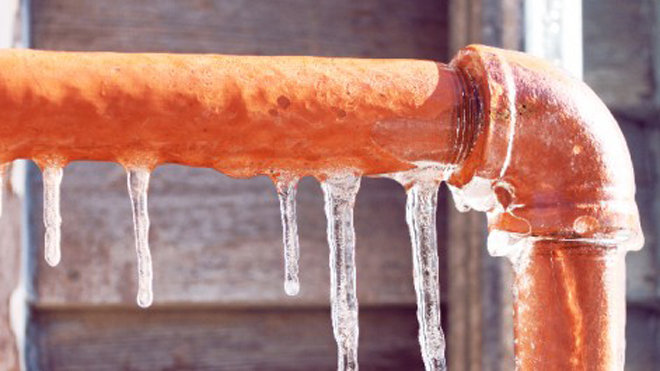Essential Tips to Avoid Frozen Plumbing in Winter
Essential Tips to Avoid Frozen Plumbing in Winter
Blog Article
We've encountered the article involving How to Prevent Your Pipes From Freezing listed below on the web and felt it made sense to write about it with you on my blog.

Cold weather can damage your plumbing, specifically by freezing pipes. Below's just how to stop it from occurring and what to do if it does.
Intro
As temperature levels decrease, the danger of frozen pipelines rises, potentially leading to pricey repair services and water damage. Comprehending just how to stop icy pipes is critical for homeowners in cold environments.
Avoidance Tips
Protecting vulnerable pipelines
Wrap pipes in insulation sleeves or make use of warm tape to shield them from freezing temperature levels. Focus on pipelines in unheated or exterior areas of the home.
Home heating strategies
Maintain indoor rooms sufficiently heated, especially areas with plumbing. Open cupboard doors to enable cozy air to distribute around pipelines under sinks.
How to determine icy pipelines
Search for reduced water circulation from taps, uncommon smells or sounds from pipelines, and noticeable frost on subjected pipes.
Long-Term Solutions
Architectural changes
Consider rerouting pipes away from outside wall surfaces or unheated areas. Add extra insulation to attics, cellars, and crawl spaces.
Upgrading insulation
Purchase high-grade insulation for pipes, attic rooms, and walls. Correct insulation aids keep constant temperature levels and reduces the threat of icy pipes.
Securing Outside Pipes
Garden tubes and outdoor taps
Separate and drain garden hoses prior to winter. Set up frost-proof faucets or cover outside faucets with insulated caps.
Understanding Icy Pipelines
What causes pipelines to ice up?
Pipelines freeze when subjected to temperatures below 32 ° F (0 ° C) for extended periods. As water inside the pipes ices up, it increases, taxing the pipe walls and possibly causing them to burst.
Dangers and problems
Frozen pipelines can cause water supply disturbances, residential or commercial property damages, and expensive fixings. Burst pipelines can flooding homes and create considerable structural damages.
Signs of Frozen Water Lines
Determining frozen pipelines early can prevent them from bursting.
What to Do If Your Pipelines Freeze
Immediate actions to take
If you suspect icy pipes, keep faucets available to ease pressure as the ice thaws. Make use of a hairdryer or towels taken in warm water to thaw pipes slowly.
Conclusion
Avoiding icy pipes needs aggressive actions and fast reactions. By comprehending the reasons, indications, and safety nets, home owners can protect their pipes during cold weather.
6 Proven Ways to Prevent Frozen Pipes and Protect Your Home
Disconnect and Drain Garden Hoses
Before winter arrives, start by disconnecting your garden hoses and draining any remaining water. Close the shut-off valves that supply outdoor hose bibs and leave the outdoor faucet open to allow any residual water to drain. For extra protection, consider using faucet covers throughout the colder months. It’s also important to drain water from any sprinkler supply lines following the manufacturer’s directions.
Insulate Exposed Pipes
Insulating your pipes is an effective way to prevent freezing. Pipe insulation is readily available at home improvement stores and is relatively inexpensive. Pay close attention to pipes in unheated areas such as the attic, basement, crawl spaces, or garage. Apply foam insulation generously to create a buffer against the cold. You can also wrap your pipes in heat tape or thermostat-controlled heat cables for added warmth.
Seal Air Leaks
Inspect your home for any cracks or openings that could let in cold air. Seal any holes around the piping in interior or exterior walls, as well as the sill plates where your home rests on its foundation. Additionally, make sure to keep your garage door closed unless you’re entering or exiting. Leaving it open creates a significant air leak that can lead to frozen pipes.
Allow Warm Air Circulation
During cold snaps, it’s essential to allow warm air to circulate evenly throughout your home. Leave interior doors ajar to promote better airflow. Open kitchen and bathroom cabinets to help distribute heat consistently around the rooms. If you have small children or pets, be sure to remove any household chemicals or potentially harmful cleaners from open cabinets for safety.
Let Faucets Drip
A small trickle of water can make a big difference in preventing ice formation inside your pipes. When temperatures drop significantly, start a drip of water from all faucets served by exposed pipes. This continuous flow helps prevent the water from freezing. Additionally, running a few faucets slightly can relieve pressure inside the pipes, reducing the chances of a rupture if the water inside does freeze.
https://choateshvac.com/6-proven-ways-to-prevent-frozen-pipes-and-protect-your-home/

As a fervent person who reads on Helpful Tips to Prevent Frozen Pipes this Winter, I was thinking sharing that excerpt was really helpful. Sharing is nice. Helping others is fun. Thanks a lot for going through it.
Schedule Report this page